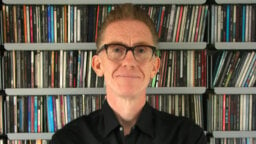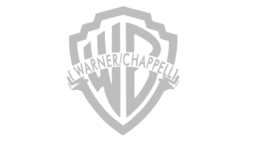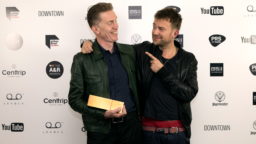When British exec Mike Smith won the prestigious Sir George Martin Award at the MBW-presented A&R Awards in London four years ago, he made a speech that spoke volumes about his approach to music publishing.
“A&R people have a habit of talking ourselves out of brilliant decisions,” he commented. “It’s very easy to talk yourself out of why you should sign something. If we can listen to our guts a little bit more, we can really do some magic.”
He was referring to the signing of artists and songwriters, obviously. But, earlier this summer, Smith didn’t talk himself out of signing something else that would change the course of his own career.
That something was a contract to take over a newly-created role as Global President of Downtown Music Publishing, effective from September.
As we wrote at the time, this wasn’t only a significant deal for Smith – joining, in Downtown, one of the fastest-growing forces in the modern music business – but also for his new employer.
With London-based Smith on board, Justin Kalifowitz, the founder and CEO of Downtown, will now be free to dedicate more of his focus beyond just publishing, and across Downtown Music Holdings’ myriad businesses – which also include publishing admin service Songtrust, plus the likes of CD Baby (acquired, with parent AVL, in a nine-figure deal last year) and FUGA (acquired for an eight-figure sum earlier this year).
In addition to Kalifowitz, Smith joins a Downtown team that also includes Downtown Music Publishing’s UK EVP (and Downtown Music Holdings’ Head of European Business Development), Roberto Neri, and which recently swooped to acquire one of the biggest modern indie publishers in the UK, Good Soldier Songs (The 1975, Biffy Clyro).
In May, Downtown also made an exciting move into Africa, via the acquisition of South Africa-based Sheer Music Publishing, run by David Alexander.
In Smith, the company will benefit – for one thing – from a widely-respected A&R mind who has previously signed the likes of Calvin Harris, Mark Ronson, Gorillaz, The White Stripes, Arctic Monkeys, Arcade Fire and Damon Albarn.
Smith also brings the weight of his experience at a number of major music companies, including Columbia Records UK, where he was Managing Director from 2006 to 2012, Virgin EMI, where he was President of Music from 2013 to 2016, and Warner Chappell Music, where he held the role of UK MD before stepping down earlier this year.
MBW recently caught up with Smith to talk about Downtown’s rapid expansion, and his own ambitions in a pivotal global role at the company…
After deciding to leave Warner Chappell UK, your name would have been on the shortlist for hiring and/or consulting at a number of large scale companies. Why choose downtown?
It’s interesting: I’ve had opportunities [to join indies in senior roles] before and I’ve always made the decision to go with a larger company just because you learn a great deal from those experiences. But in terms of companies that are that are involved in the music and songwriting space today, Downtown, without question, is the most forward-thinking; I’ve found it really inspiring looking at the breadth of businesses that they’ve been getting involved in.
Those that haven’t been following the story closely might just think of Downtown as a really good independent publisher. But their involvement with AVL and CD Baby, with Songtrust and elsewhere, it very much embraces what the future of music creation is going to be.
“in many cases the artists that are earning a substantial amount from streaming, apart from the global superstars, are the ones that own their own copyrights.”
I find it very exciting that artists are discovering that, actually, they can make a decent living for themselves without having to become the biggest artist in the world. And that might, in fact, be the [best route] to a sustainable career that lasts decades rather than years.
I’ve talked to many artists over the last couple of years who have made the decision not to sign with major companies; in many cases the artists that are earning a substantial amount from streaming, apart from the global superstars, are the ones that own their own copyrights. That’s something that Downtown is in the middle of; they want to facilitate the independence of artists, and build a suite of businesses around those artists.
In terms of publishing, Which areas do you think downtown can grow the fastest in going forward?
There’s two key areas: acquisition in terms of new talent, but also in terms of catalogs and, potentially, publishing companies. I remember conversations five years ago when people were saying, ‘All of the big publishing company [acquisition] opportunities have been and gone.’ Well, publishing continues to be one of one of the most dramatic areas of the music industry [in terms of M&A]. There’s always new artists coming through, and always new catalog [becoming available] to acquire.
The big shock for me coming back into music publishing after records [when joining Warner Chappell in 2016] was the limited tenure of contracts. Songwriters were potentially moving between publishing companies every three years. And there’s a lot of positives in that, simply for the fact that the publisher has to work hard to prove their worth to the songwriter, so no one is sitting on their hands anymore.
“There’s always new artists coming through, and always new catalog [becoming available] to acquire.”
The expansion of Downtown is very exciting. AVL have offices all around the world, and obviously Downtown’s in a lot of places that even some of the majors aren’t. It’s great that Downtown just got involved in Africa with the acquisition of Sheer, and there are many more places where there’s real opportunity for expansion.
Off the top of my head you think about Southeast Asia, South America, Central America, the Caribbean, the Far East, India – so many fascinating areas to move into, and to move further into.
You remain London-based, although I’m sure you’ll be on quite a few planes when we’re allowed to get back on them. To your mind, are there advantages to being based in London as opposed to the obvious global music biz hubs of New York and Los Angeles?
It’s so important to see music publishing as a global business now. For far too long, it’s too often been thought of as America and the UK, plus Scandinavia, with little pockets elsewhere. That said, that attitude has improved immeasurably since I was in publishing the first time round at EMI [where Smith worked as Head of UK A&R in the nineties, signing the likes of Arctic Monkeys, The White Stripes, Gorillaz and PJ Harvey].
It’s been great seeing what’s been happening in Nigeria [and] Ghana over the last few years, for example, but also the explosion of Latin American music and what we’re seeing now coming from Southeast Asia.
“Obviously, [the US] is the the biggest music market in the world, and the biggest source of music in the world. But it isn’t the only source.”
I think it’s very easy when you’re in America to slip into a bubble, to think that the entire world revolves around North American music. And obviously, [the US] is the the biggest music market in the world, and the biggest source of music in the world. But it isn’t the only source.
If we’re looking to grow our business, to have a competitive edge over other other companies, it’s vital that we expand and go deep into areas that other companies haven’t been.
What’s on your agenda coming in to Downtown in September?
One of the absolute key things for me is actually looking at a broader scope of issues rather than just the business of music publishing.
I had a conversation at the end of last year with the with the producer, Bob Ezrin. And he was saying, ‘For God’s sake, Mike, you’ve got to stay in a position where you’re at the forefront of the business.’ As far as both he and I were concerned at that time, the most important issue facing us was climate change. [His point] was that being at a senior level in the business brings the opportunity to do good beyond just your company and, potentially, beyond the music publishing sector.
Obviously, we’ve since seen Black Lives Matter become a major talking point, as well as what’s happened with Coronavirus. There’s huge issues that we need to address in terms of diversity and inclusion in our businesses. It’s a big part of why I wanted to take this job, to work with songwriters and a company who care passionately about these issues.
What did you learn at Warner Chappell? How did that experience improve your professional skillset in ways that can now benefit downtown?
One of the reasons I really wanted to go to Warner Chappell was that I felt I was getting a little bit silo’d in records [at Virgin EMI].
There was a lot of A&R work for me to do with with more mature and more experienced artists, but I was sitting there looking at the most exciting explosion of young musical talent in the UK since, for me, the late ’70s and early ’80s. And it was difficult to get involved in that from the position I had.
I knew that going into Warner Chappell, working with Amber Davis [now Warner Chappell UK’s Head of A&R] – who by that point had already signed Skepta and Stormzy – we could be unbeatable. The ability to go out, follow our instincts and sign aggressively was a massive buzz for me and a real opportunity to embrace music with a level of righteousness that I hadn’t seen for a long, long time.
That required tremendous amounts of flexibility and imagination in deal-making; you were constantly having to think entrepreneurially, to come up with new solutions and new ideas, which I found refreshing and energizing.
Justin Kalifowitz has built Downtown into the force it is today over the past 13 years. You report to him in your new role.
I would not have made this move if it hadn’t been for Justin. I mean, Downtown is incredible; they’re doing amazing things. But he’s a truly remarkable executive. I haven’t met anyone like him in the business.
I remember Justin from when I was working at EMI Music Publishing. Even back then he struck me as an imaginative executive who was really thinking and strategizing about where the industry was going. I went into the record business in 2005 or 2006, which was a time of tremendous change. Now we’re in the midst of another great change: the live business is moving more into a world of live streaming, which could become one of the biggest revenue sources for the industry going forward.
I like that Justin recognized he’s only got so many hours in the day, so to try and focus on managing the publishing company, as well as managing all of the other businesses at Downtown, was becoming less practical. That said, publishing remains the bedrock of this company. And I take my responsibility to the legacy of that very, very seriously.
With your experience at major publishing organizations you have an idea of what blockbuster global signing figures look like. Is your war chest at downtown able to compete?
I think you can see from the acquisitions that Downtown has made in the last couple of years, there’s no issues about war chest!
When it is appropriate, as you saw with the recent acquisition of Good Soldier, there’s no deal that we’re we’re not in a position to go after. I’m in no doubt that Downtown is a very, very competitive company.
“I’m in no doubt that Downtown is a very, very competitive company.”
We’re not going to chase every single catalog, or every single new artist that comes through, just because it’s a hot act.
There’s a lot of taste in the roster here. It’s been curated incredibly well, and over time, I plan to add to that in a similar fashion.
What would you like to see change in the business today?
It’s interesting to think that the key performance indicators on which bonuses are decided today are always based on economic performance. And that will obviously be the bedrock going forward. But I think we also need to make sure that people have bonuses, or an [incentivized] focus, linked to inclusion and diversity in the workplace. It’s frustrating when people don’t realize that it’s a massive business advantage to have a diverse workforce and roster. I cannot understand why anybody wouldn’t want that.
Increasingly, the artists we were involved with Warner Chappell were wanting to know: What’s the make-up of your company? What was the makeup of your senior management board? What’s your policy when it comes to mental health? What’s your policy when it comes to the environment? And I felt really proud of the fact that we we built a mental health strategy, we built an environmental strategy, we had a very strong diversity and inclusivity strategy.
It’s not just about hiring people from different groups, be that a diversity of gender or sexuality or ethnicity. It’s about mentoring, training, and, where you see germ of real star talent, making sure you bring that through.Music Business Worldwide





